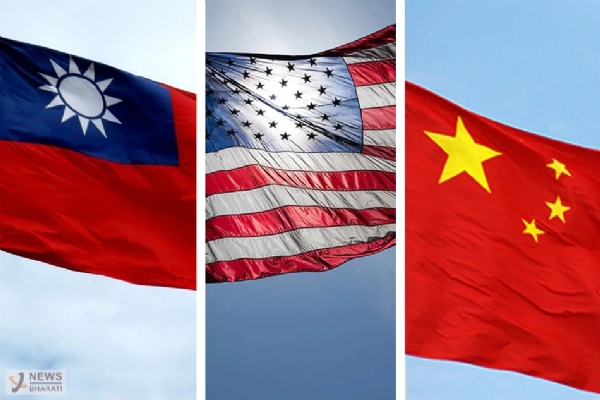China’s reaction to continued US support to Taiwan
The act provides for US$ 10 billion for Taiwan’s aid over the next five years provided that Taiwan also increases its own defence budget.
Total Views |
Last week, the US government passed the ‘National Defense Authorization Act’ to provide around US$ 858 billion as its defence budget for the fiscal year 2023. However, it has created an uproar among Chinese policymakers due to generous provisions made in this act for Taiwan.

The act provides for US$ 10 billion for Taiwan’s aid over the next five years provided that Taiwan also increases its own defence budget. Further, it also recognizes Taiwan Enhanced Resilience Act (TERA) which will establish a dedicated defence modernization programme for Taiwan. The same act also makes provisions to encourage more arms sales to Taiwan through loans as well as strengthen its military capabilities against potential Chinese attack. This will enable Taiwan to procure modern warships and fighter jets from the US and strengthen its position in cross-strait conflict.
This act is a major escalation as per China after Nancy Pelosi’s visit in early August and likely to serve as another deal breaker between US-China relations. The spokesperson of China’s Foreign ministry commented that this law interferes in China’s internal affairs and exaggerates ‘China threat’ (渲染 ‘中国威胁’). This has been a standard reaction by the Chinese foreign ministry after every escalation from the US side. It has gone further to call out the bluff of USA’s intentions to “contain China with Taiwan” (以台制化) and also warned the US to abide by ‘one China principle). Similarly, the spokesperson of China’s Defense ministry stated that such actions by the US will poison bilateral relations at all levels and also lead the region into turmoil. Along with this, the spokesperson also called on the US to stop its zero-sum mentality (零和博弈) and acknowledge China’s core interests like Taiwan.
The Taiwan affairs office of State Council of China commented that this act will strengthen separatist forces in Taiwan by "handing knives and guns” (递刀子 送枪炮) which can push the people in Taiwan to the brink of war. It also warned the Taiwan government to stop seeking help from outside forces to resist the mainland. It is noteworthy that the US has changed its attitude from earlier symbolic gestures of support to actual military build-up on the ground in Taiwan. Global Times reported that this act mentioned China 331 times and Taiwan 467 times which is significantly higher compared to mentions of Ukraine (165 times) and Russia (401 times). Despite this, the current diplomatic response by China is largely in line with its previous responses at the time of Pelosi’s visit. This might indicate that China does not wish to escalate this issue beyond a limit considering its current delicate domestic situation. Some economic and military measures may also follow in the coming days. However, it is highly unlikely that these measures will deviate significantly from previous responses.
Also Read: Internet Censorship Regime in China
For instance, China sent nearly 71 warplanes near Taiwan immediately after the US government announced the law. Out of these, 47 planes are said to have crossed the median line in Taiwan strait (unofficial border between China and Taiwan) and also entered Taiwan’s air defence identification zone. It included both fighter jets as well as anti-submarine planes under joint combat alert patrols and firepower drills of PLA’s Eastern Theater Command. As per China’s Defence ministry, this is the highest daily recorded PLA aircrafts observed in its airspace since 2020. However, these incidents have now become a regular phenomenon and do not indicate China’s intentions to escalate this issue beyond a certain limit. It is also evident from the fact that these mock drills were much smaller in quantity and intensity compared to live-fire drills launched after Pelosi’s visit in August. Some military analysts in China have opined that this act will start a new arms race which will also increase the possibility of military conflict. In reality, the arms race in this region has been going on for years and this act will only help Taiwan to reduce the gap with China.
Both China and the USA seem to have been trapped in a vicious cycle where every US action towards Taiwan is countered by increased air and maritime military incursions by China which in turn compels the US to reinforce its support to Taiwan through different channels. According to Menendez, Chairman of the US Senate foreign relations committee, China is the “most significant” challenge that the US has faced in many years and thus, Taiwan will play a crucial role in creating a deterrence for China’s rising global power.
Also Read: China’s New Arabian Diplomacy
Thus, this scenario is likely to continue in the near future as long as Taiwan remains one of the most sensitive issues for China. This act also indicates a shift in the US attitude from ‘strategic ambiguity’ to ‘strategic clarity’ on the Taiwan issue and it may actually deter China from deferring its attack on Taiwan. Thus, it is clear that this issue will continue for a long period without any substantial solution. As for India, this prolonged conflict will be partly beneficial as it will create a possibility of reduction in tensions at the border until Taiwan remains a priority for China, albeit at the cost of regional instability in the Indo-Pacific region. Moreover, lack of reciprocity in India-Taiwan relations may limit India’s benefits. Hence, India urgently needs to strengthen its relations with Taiwan to stand up to China at borders as well as in other domains.


